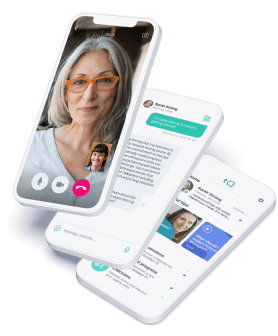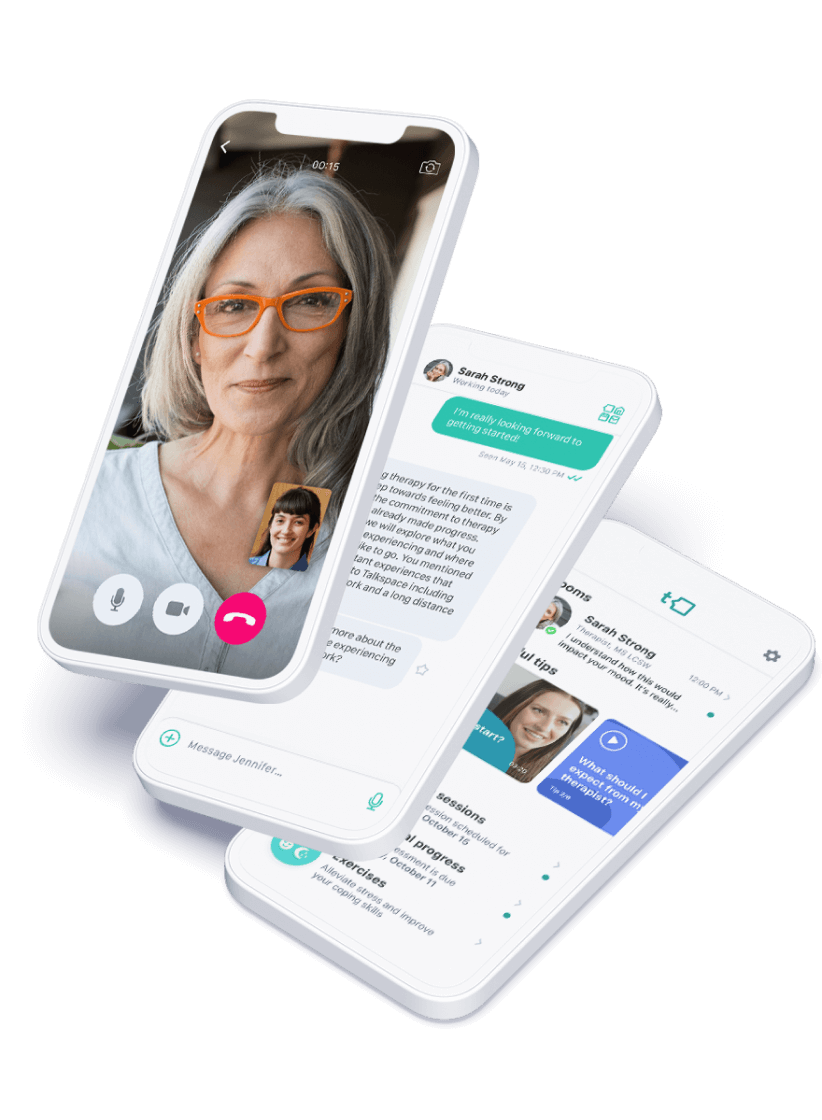Updated On: May 3, 2024
Overview
Depression is a daunting, overwhelming mental health condition. During its worst moments, it can darken your mood and make you unable to feel. It can twist your thinking and dampen the pleasures you once enjoyed. Depression can stifle creative forces and virtually deplete most, if not all, of your hope in life.
If this is resonating with you, it’s important that you understand: depression is common. It’s so prevalent today, studies show that in the United States alone last year, more than 21 million adults experienced one or more major depressive episodes.
There is some good news, though. Depression is treatable, and with the right information and tools, you can learn how to manage it. If you’re wondering: how do you treat depression, you’re not alone — many people living with depression are looking for help so they can get back to enjoying their life.
We’re taking an in-depth look at different ways to treat depression that are known to be effective in reducing both frequency and severity of depression symptoms. From therapy, to medication, to holistic approaches, you have options when it comes to treating your depression.
- Psychotherapy
- Cognitive behavioral therapy (CBT)
- Dialectical behavioral therapy (DBT)
- Exposure therapy
- Interpersonal therapy (IPT)
- Behavioral activation therapy (BA)
- Acceptance and commitment therapy (ACT)
- Medication
- Holistic treatments
Educating yourself about depression and learning how each approach works is an excellent first step toward improving your mental health.
Types of Treatment for Depression
We all feel sad sometimes, but depression is more than just sadness. It’s not what many people think, like just lacking willpower or being lazy. Instead, it’s holding a true belief that things will never be better for you and your personal darkness will never go away.
Left untreated, chronic depression will likely worsen. This common but treatable mental health condition can cause heavy emotional pain, not only for you but for those who love and care about you, too. There’s good news, though — there are ways to treat depression that are effective and safe.
There’s much evidence to support that people who seek professional treatment for depression typically find significant relief. Mental health professionals suggest a combination of talk therapy, medication, and lifestyle changes as ways to treat depression.
Let’s begin by looking at some of the recommended depression treatment options experts like the Anxiety and Depression Association of America (ADAA) recommend.
Psychotherapy (or talk therapy) for depression
You can also resort to therapy for depression. Psychotherapy is the clinical term for talk therapy, which involves various treatment modalities. During talk therapy sessions, you sit down with a licensed mental health professional and work together to examine what might be triggering your depression.
How does psychotherapy treat depression?
Talk therapy helps to treat depression by teaching and encouraging you to:
- Understand major life events that might be triggers for depression symptoms, like a death in the family, a divorce, or loss of fortune
- Learn to better manage emotional responses and behaviors that depression triggers
- Learn new problem-solving and coping techniques
- Regain the ability to experience pleasure and joy
It might help to take a closer look at each of the common types of talk therapy used for depression.
Cognitive behavioral therapy (CBT)
Cognitive behavioral therapy (CBT) aims to identify and reframe certain thought patterns and improve your responses to challenging events. This therapeutic modality assumes that depression largely results from having negative past life experiences, a negative view of yourself, and negative expectations about future events.
“Fortunately, depression is a mental health issue that can be treated with different types of therapy. Cognitive Behavioral Therapy (CBT) is one of the main ones because it has proven to be effective.”
 Licensed Clinical Social Worker-Supervisor (LCSW-S), CIMHP, EMDR Cynthia Catchings
Licensed Clinical Social Worker-Supervisor (LCSW-S), CIMHP, EMDR Cynthia Catchings
If you’re clinically depressed, you might feel helpless and incapable of changing your situation. Maybe you feel self-conscious or think that everyone is constantly watching and judging you.
Dialectical behavioral therapy (DBT)
DBT is effective in treating the most common symptoms of depression. Since DBT is a therapy technique that largely focuses on regulating emotions, it makes sense that it might be a good therapeutic option in managing depressive moods.
When DBT is used in therapy sessions, in addition to emotion regulation, it can also help you hone skills in the following basic areas:
- Distress tolerance
- Mindfulness
- Interpersonal effectiveness
Exposure therapy
Exposure therapy is a technique most often associated with treating post-traumatic stress disorder (PTSD), but it’s been found successful in treating multiple other conditions, including depression, as well.
“As a therapist, I incorporate CBT from the start when treating depression. However, every client is different, and they may need for us to add other approaches, such as exposure therapy, where the client is led to try the object or event that creates the depression.”
 Licensed Clinical Social Worker-Supervisor (LCSW-S), CIMHP, EMDR Cynthia Catchings
Licensed Clinical Social Worker-Supervisor (LCSW-S), CIMHP, EMDR Cynthia Catchings
Exposure therapy for depression works by slowly increasing exposure to events and memories that trigger depressive episodes in a safe, controlled, guided environment. This can be effective in helping you re-examine some of the events in your life that have resulted in your depression.
Interpersonal therapy (IPT)
The ADAA defines interpersonal therapy as “a time-limited treatment for major depressive disorder. It aims at reducing or eliminating depressive symptoms by improving the quality of the patient’s current interpersonal relations and social functioning.”
While IPT and CBT are both time-limited therapies, IPT centers on emotions and their effects, while CBT focuses on mental processes associated with emotions. IPT has shown in studies that, when used in combination with depression medication, it can be at least as effective as some other short-term approaches.
Behavioral activation therapy (BA)
The Society of Clinical Psychology, a division of the American Psychological Association, recommends BA as a treatment for depression. BA works by seeking to replace activities and thought patterns that intensify depression with those that bring happiness and satisfaction. This action-based therapy focuses on encouraging and rewarding positive behaviors over negative ones.
Acceptance and commitment therapy (ACT)
Acceptance and commitment therapy (ACT) helps you focus on experiences in life as they come. Rather than trying to change things, you’ll learn to accept them. It’s an action-oriented approach that’s been found effective in treating depression and other mental health and medical conditions.
“Some types of therapy require more guidance than others, examples of this are DBT and ACT. Conversely, CBT is easier (change your thoughts = change your behaviors). With the latter, the client can quickly learn the needed skills and tools to decrease their depression.”
 Licensed Clinical Social Worker-Supervisor (LCSW-S), CIMHP, EMDR Cynthia Catchings
Licensed Clinical Social Worker-Supervisor (LCSW-S), CIMHP, EMDR Cynthia Catchings
Medications for depression
While talk therapy alone can relieve depression, it’s often used in conjunction with prescription medication. According to ADAA, when combining medication and therapy to treat depression, it’s common to see significantly better rates of improvement. This is true even in chronic, more severe, or complex cases.
How does medication treat depression?
There’s a lot of evidence that common antidepressant medications work to improve mood in some depressed people, but the truth is, it’s not totally understood how many of these drugs work. They seem to offer relief by slightly changing brain chemicals called neurotransmitters, which enable brain neurons to perform more efficiently.
“There are different medications for depression and there is no better or worse. Some may work for a client better than the others. Something I recommend is to keep a log of symptoms or side effects when you start taking them. Then, you can share it with your doctor, and together you can decide if the medication is working for you, if the dosage needs to be changed, or if you need a different one.”
 Licensed Clinical Social Worker-Supervisor (LCSW-S), CIMHP, EMDR Cynthia Catchings
Licensed Clinical Social Worker-Supervisor (LCSW-S), CIMHP, EMDR Cynthia Catchings
Selective serotonin reuptake inhibitors (SSRIs)
SSRIs target a neurotransmitter called serotonin, which helps to regulate sleep, mood, and appetite.
Common SSRIs include Zoloft (sertraline), Celexa (citalopram), and Prozac (fluoxetine)
Serotonin and norepinephrine reuptake inhibitors (SNRIs)
SNRIs block the reabsorption of both serotonin and norepinephrine (noradrenaline) to enhance mood, appetite, and sleep.
Common SNRIs include Effexor XR (venlafaxine), Pristiq (desvenlafaxine), and Cymbalta (duloxetine)
Tricyclic antidepressants (TCAs)
TCAs are the old standards for antidepressant medications. They’re typically only used today when SSRIs and SNRIs fail to be effective.
Common TCAs include Pamelor (nortriptyline), Anafranil (clomipramine), and Tofranil (imipramine)
Doctors sometimes use other drugs in conjunction with antidepressants to optimize effects, including mood stabilizers like lithium or valproic acid.
In cases of severe depression, where symptoms include delusion or suicidal thoughts, antipsychotic drugs might be prescribed. They can include:
- Zyprexa (olanzapine)
- Haldol (haloperidol)
- Abilify (aripiprazole)
- Risperdal (risperidone)
- Geodon (ziprasidone)
All antidepressants take time to saturate your system and begin delivering positive effects. It can sometimes take months to experience the full impact of a new medication. As with any prescription drugs, depression medications are associated with possible adverse side effects. You may need to try several antidepressant medications to find one or a combination that works for you.
Holistic treatment for depression
Hesitant to rely on antidepressant medication? There’s no shame in turning to natural remedies for depression. Holistic treatment for depression typically involves an all-inclusive system of treatment from multiple professionals. If you’re wondering, how do you treat depression without drugs, holistic treatment might be an avenue worth exploring.
“Incorporating a holistic approach is becoming more popular amongst mental health professionals. Combining the efforts of a psychiatrist, a therapist, and the primary practitioner can help clients reach their goals faster.”
 Licensed Clinical Social Worker-Supervisor (LCSW-S), CIMHP, EMDR Cynthia Catchings
Licensed Clinical Social Worker-Supervisor (LCSW-S), CIMHP, EMDR Cynthia Catchings
Benefits of a holistic approach
Holistic treatment for depression often involves implementing certain lifestyle changes. Living a more holistically healthy life will enhance the effects of any medical and psychological treatments you might receive.
“When a group of professionals can talk and exchange about their client, the benefits can be seen much faster, and the depressive symptoms are more visible.”
 Licensed Clinical Social Worker-Supervisor (LCSW-S), CIMHP, EMDR Cynthia Catchings
Licensed Clinical Social Worker-Supervisor (LCSW-S), CIMHP, EMDR Cynthia Catchings
Some lifestyle changes that may be beneficial in treating depression include:
- Engaging in creative activities like creating art or music
- Writing in a daily journal
- Keeping a gratitude list or journal
- Saying mantras
- Getting enough sleep
- Spending time socializing
- Getting outdoors
- Working out
- Eating foods that help reduce inflammation and toxicity in the body
- Enjoying a relaxing massage
- Light therapy
- Acupuncture
- Learning about and practicing mindfulness meditation
- Yoga
- Tai chi
- Pilates
“The combination of talk therapy, mindfulness activities, and medication yields faster results than using only one of those options.”
 Licensed Clinical Social Worker-Supervisor (LCSW-S), CIMHP, EMDR Cynthia Catchings
Licensed Clinical Social Worker-Supervisor (LCSW-S), CIMHP, EMDR Cynthia Catchings
Psilocybin (magic mushrooms) therapy
Multiple studies have shown controlled psilocybin usage can reduce major depressive disorder symptoms, and effects can last up to a full year. Another benefit is that the effects are noticed at once, and further dosages are generally not necessary. It’s important to note that this form of treatment is intended for clinic-use only. Psilocybin is still being studied and is not a widely accepted form of treatment. If you’re suffering from chronic depression, you might want to ask your doctor or therapist about this emerging therapy.
Find Treatment for Depression with Talkspace
Before trying any of these treatment options it’s important to understand how to get diagnosed with depression. If you’re diagnosed by a professional as having severe depression, it’s time to start looking at all the ways to treat depression that might be best for you. If you’re uncomfortable with approaching a professional about your symptoms, consider taking an online depression test, like the one offered by Talkspace.
Tests like these offer a safe, noninvasive indication of where you’re at and can let you know if it’s time to think about how to treat depression you may be experiencing. They can also be a useful starting point if you do decide to seek professional help.
Talkspace’s online therapy treatment options offer a new approach to treating depression. From the comfort of your own home, at the times that are most convenient for you, you can find the help you need with a caring, licensed, experienced mental health professional.
If your depression symptoms are severe or if you’re having thoughts of self-harm or suicide, get help immediately. You can call either the National Suicide Prevention Lifeline (800-273-8255) or the National Substance Abuse and Mental Health Services Administration Helpline (SAMHSA) at 800-662-HELP (4357). Both provide free help with treatment referrals, advice, or give you someone to talk to.
See References
-
Major Depression
National Institute of Mental Health (NIMH). Published 2022. Accessed March 1, 2022.
-
Depression Treatment and Management
Greene, PhD P. Anxiety and Depression Association of America, ADAA. Adaa.org. Published 2020. Accessed March 1, 2022.
-
Interpersonal psychotherapy: principles and applications
Markowitz JC, Weissman MM. World Psychiatry. 2004;3(3):136-139. Accessed March 1, 2022.
-
Depression
Society of Clinical Psychology. Society of Clinical Psychology | Division 12 of the American Psychological Association. Accessed March 1, 2022.
-
Psilocybin treatment for major depression effective for up to a year for most patients, study shows
Johns Hopkins University School of Medicine. Medicalxpress.com. Published 2022. Accessed March 1, 2022.
-
Home
Suicidepreventionlifeline.org. Accessed March 1, 2022.
-
Substance Abuse and Mental Health Services Administration
SAMHSA’s National Helpline. Published 2022. Accessed March 1, 2022.

Cynthia Catchings is a trilingual licensed clinical social worker-supervisor, mental health consultant, professor, and trainer for federal law enforcement agencies. Cynthia has over 15 years of experience in the mental health profession. She is passionate about women’s mental health, life transitions, and stress management. Her clinical work, advocacy, and volunteer service have focused on working with domestic violence survivors and conducting mental health research in over 30 countries.
Articles about Depression: Symptoms, Causes & Treatment
View all articles
What to Do if Your Teenager is Making You Feel Depressed

Post-Weaning Depression: Recognize the Signs & Find Support

How to Think Positive When Depressed: Techniques for a Brighter Outlook

Have You Fallen Out of Love, or Are You Depressed?

How to Prevent Postpartum Depression

How to Explain Depression to Someone

Are There Stages of Depression?

Can Adderall Cause Depression?

Can Depression Cause Memory Loss?

14 Effective Coping Skills for Depression


